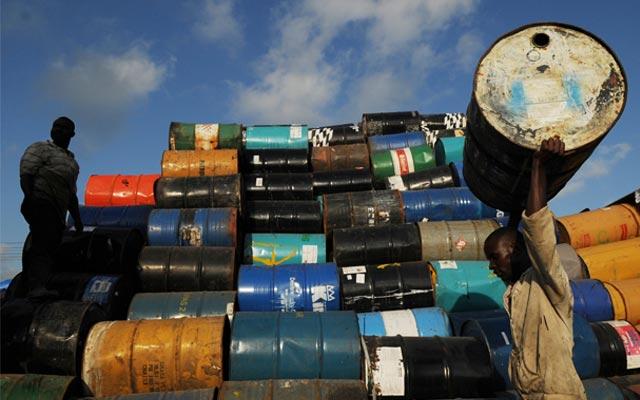Ushering in a paradigm shift in India’s energy security plans, the National Democratic Alliance (NDA) government on Thursday approved a raft of decisions including marketing and pricing freedom for gas produced from difficult areas and a new hydrocarbon policy based on a revenue-sharing model.
These issues have been hanging fire and are part of the Bharatiya Janata Party-led government’s strategy to bring transparency and market-oriented approach to India’s resource space.
“The marketing freedom so granted would be capped by a ceiling price arrived at on the basis of landed price of alternative fuels,” the government said in a statement after the decision was taken by the cabinet committee on economic affairs (CCEA) chaired by Prime Minister Narendra Modi.
This comes at a time when India’s hydrocarbon production has stagnated. The Modi government has set up an ambitious target to halve the country’s energy imports by 2030. India imported 192 million tonnes of crude oil in 2014-15 for Rs6.92 trillion.
This mechanism will only be applicable to future discoveries and those existing discoveries which did not start commercial production as on 1 January 2016. The government expects the policy to boost India’s natural gas production by firms such as state-owned Oil and Natural Gas Corp. Ltd (ONGC) and Gujarat State Petroleum Corp. Ltd. The production is expected to increase by more than a third to around 125 million standard cubic m. of gas per day (mscmd) from the present level of 90 mscmd.
“However, in case of existing discoveries which are yet to commence commercial production as on 1.1.2016, if there is pending arbitration or litigation filed by the contractors directly pertaining to gas pricing covering such fields, this policy guideline shall be made applicable only on the conclusion/ withdrawal of such litigation/arbitration and the attendant legal proceedings,” the government statement added.
While India has 310 production sharing contracts (PSCs), the government is involved in 22 arbitration cases.
The cost recovery model was also criticised by the Comptroller and Auditor General of India due to it being inadequate to incentivise private contractors to reduce capital expenditure. It led to an ongoing arbitration proceedings involving Mukesh Ambani-controlled Reliance Industries Ltd (RIL) and the Indian government over cost recovery. RIL’s D6 field in the Krishna Godavari Basin, off the country’s east coast, will not be eligible for the new pricing metrics as it started production in 2009.
A RIL spokesperson didn’t offer any comment.
Experts are terming the new policy as a game changer for the Indian oil and gas sector.
“Energy security requires investment and investment requires policy decision. This metrics has been taken care of by the government which has not only provided marketing freedom but also pricing freedom. This is the maximum that the government could have done. At the same time, it has maintained a fine balance between the interest of the consumers and producers by imposing a cap,” said D.K. Sarraf, chairman and managing director of ONGC.
ONGC has a block called KG-DWN-98/2 in the Krishna Godavari Basin and now plans to revise its capital expenditure for the block, which was earlier estimated to be around $10 billion.
“The investment proposal to the board will be presented in a couple of weeks,” added Sarraff.
The issue had found mention in the Union budget 2016, which announced “calibrated marketing freedom” for gas production from deep water, ultra-deep water and high pressure-high temperature areas.
“From now on, an unbelievable level of operational freedom will be experienced by operators of frontier offshore blocks, with respect to gas sale, compared with that in the regime thus far. The policy approved today appears to be allowing gas sale to any buyer and at any price up to that of the alternative fuels,” said Deepak Mahurkar, leader (oil and gas industry) at PwC India, a consultancy.
New policy
With the new exploration licensing policy (Nelp) unable to attract the desired levels of investment, the Union cabinet on Thursday approved marketing freedom for crude oil and natural gas under the new hydrocarbon exploration and licensing policy (HELP).
The new policy marks the culmination of the government’s bet for a revenue-sharing model from the controversial cost-recovery model which involves cost recovery by firms before the government receives its share of the revenue. This new template was signalled last year in the case of marginal fields.
“The earlier contracts were based on the concept of profit sharing where profits are shared between the government and the contractor after recovery of cost. Under the profit sharing methodology, it became necessary for the government to scrutinise cost details of private participants and this led to many delays and disputes,” said the government statement.
The new policy also allows for exploration for all types of hydrocarbon resources including coal-bed methane or gas hydrates under a single licence. Moreover, an open acreage approach would finally allow firms to choose the areas of their liking for exploration.
“Nelp to HELP policy transition too is aimed to minimise need for government decision-making while undertaking E&P (exploration and production) right from day 1. Investors were apprehensive about discretion government agencies could exercise in matters that affect business objectives. That is now addressed comprehensively in favour of investors,” added Mahurkar.
Other decisions
The other decisions taken on Thursday included granting extension to the PSCs for 28 small-, medium-sized and discovered fields, and cancellation of Ratna and R-Series fields off the Mumbai coast which was earlier awarded to a consortium led by Essar Oil Ltd. The fields are to be awarded to ONGC.
While an Essar Group spokesperson declined comment, Sarraf said, “It is a golden day for the industry and for ONGC.”
The NDA government also approved a scheme titled Pradhan Mantri Ujjwala Yojana to provide free 50 million domestic cooking gas connections to women from below poverty line (BPL) households as was announced in the Union budget 2016. Apart from helping to improve women’s health, such a step will also demonstrate India’s commitment to environment, as committed at the recently concluded United Nations Climate Change Conference in Paris. India has around 140 million domestic cooking gas customers.







